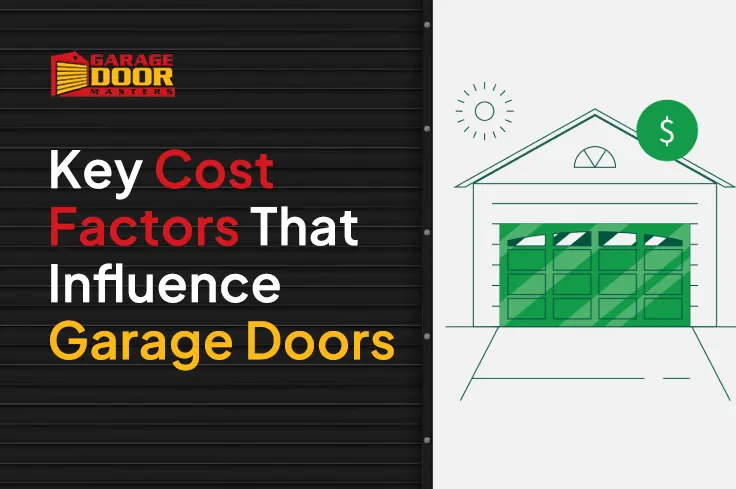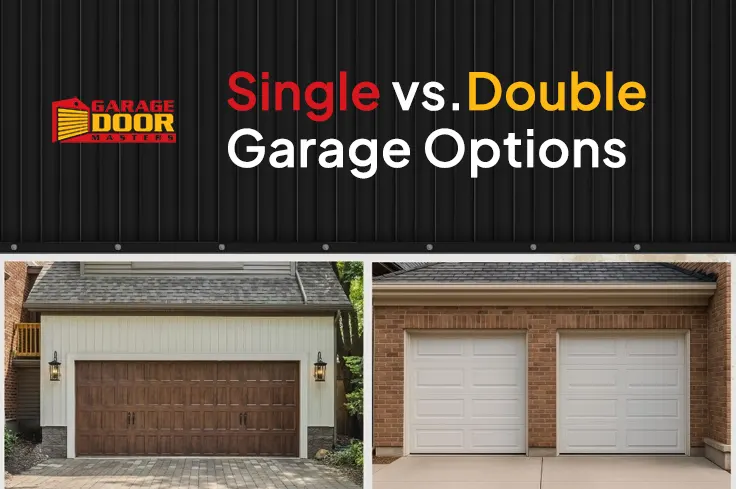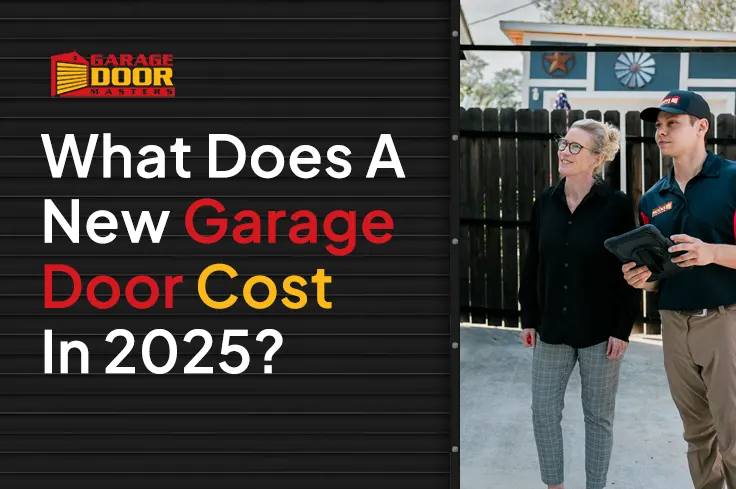Consider upgrading your garage door this year. You’re not alone. A fresh, modern option can instantly boost your home’s curb appeal, improve energy efficiency, and even increase resale value.
But before you start shopping, it’s smart to know what kind of price tag to expect. The new garage door cost in 2025 depends on several factors like material, style, and size, but don’t worry, we’ve broken it all down for you. Let’s dive into what you can expect to pay this year, what’s driving those costs, and how to get the best bang for your buck.
Understanding the Average New Garage Door Cost in 2025
In 2025, homeowners can expect the average new garage door cost to range between $1,200 and $3,000 for most standard options. Basic steel models with manual operation fall on the lower end, while insulated, smart, or custom wood doors can reach $5,000 or more. The price you pay depends heavily on the material you choose and the size of your garage.
Steel doors remain a top pick thanks to their durability and low maintenance. Aluminum is lightweight and modern-looking but less insulated. Wood offers that timeless, classic appeal, though it requires more upkeep. Meanwhile, composite doors are becoming popular for combining beauty and resilience without the high maintenance costs of real wood. The growing trend toward energy-efficient and insulated designs has nudged prices up slightly, but they can also save money long-term on heating and cooling.
Has the Average Garage Door Replacement Cost Gone Up?
The average new garage door cost has gone up, but not dramatically. Compared to 2023 and 2024, the garage door replacement cost in 2025 has seen a moderate increase of around 5% to 8%. The rise comes from higher material costs, increased demand for smart technology integration, and inflation-driven labor expenses. However, the good news is that these price hikes often come with better features and higher-quality products.
Newer garage doors often include improved insulation, noise reduction, and advanced security systems. Many models are also compatible with smart home setups, letting you open or monitor your garage from your phone. So, while the upfront new garage door cost is higher, homeowners are getting more functionality and convenience in return.
Key Cost Factors That Influence Garage Doors

Several key factors determine the final new garage door cost, including materials, size, insulation, and design features. Materials like steel and aluminum are typically the most affordable, while natural wood or carriage-style doors can cost more due to their craftsmanship and custom designs. If you want energy savings, consider insulated models: they cost more upfront but pay off in long-term comfort and efficiency.
Another major factor influencing new garage door costs is the complexity of the installation. Homes with unique openings or older structures may need extra framing or electrical work, which can add to the overall cost. Optional upgrades like decorative windows, premium hardware, or smart openers also affect pricing. Ultimately, the correct choice balances appearance, performance, and your budget.
How to Save Money on Garage Doors
You don’t have to break the bank to get a great new garage door. Here are a few smart ways to save:
- Shop during seasonal sales: Spring and fall are prime times for home improvement discounts.
- Compare multiple quotes: Always get at least three estimates from reputable installers.
- Stick to standard sizes: Custom dimensions can dramatically raise costs.
- Choose mid-grade materials: They often offer the best mix of value and longevity.
Another underrated tip to keep new garage door costs low: maintain your door regularly. Lubricating moving parts, checking springs, and cleaning the tracks can extend its lifespan and prevent costly repairs down the road.
Cost to Replace a Garage Door: Single vs. Double Garage Options
A significant factor in your garage door replacement cost is whether you have a single or double setup. A single typically ranges from $800 to $1,800, depending on material and design. In contrast, double, which covers two car bays, can range from $1,500 to $3,500 or more.
Double doors require more material, larger openers, and sometimes extra labor. However, you can often save by installing two single doors instead of one large double door, especially if one side needs repair later. The choice largely depends on your home’s layout and the look you’re going for.

Hidden or Additional Costs to Consider
When budgeting for your new garage door cost, it’s essential to think about extra expenses that often go unnoticed. For example, removing and disposing of your old door can add $100 to $250. Electrical work for new openers or safety sensors might add another $200 to $500, depending on the complexity.
Don’t forget about potential permit fees when looking at new garage door costs, particularly if you’re making structural changes to your system. And if you opt for custom paint or finish, that’s another $100–$300. Planning ahead for these smaller costs prevents unpleasant surprises during installation.
Choosing the Best Garage Door for Your Home
Selecting the perfect option goes beyond cost: it’s about blending style, durability, and performance. Think about your home’s architecture: carriage-style doors look great on traditional houses, while sleek, aluminum-framed models suit modern designs. Insulated steel doors are ideal for attached garages since they help maintain indoor temperatures.
Also, consider your climate. If you live in a humid or coastal area, opt for rust-resistant materials like aluminum or composite. And don’t underestimate color: today’s garage doors come in a wide variety of finishes, from bold matte blacks to natural wood tones. The right choice can make your home feel more inviting and complete.
Conclusion: Replacing Your Garage Door in 2025
Replacing your garage door is one of the smartest home investments you can make in 2025. While the new garage door cost may vary based on materials, size, and features, the long-term value it adds to your home is undeniable. With a modern design, better insulation, and convenient smart controls, today’s doors are both functional and stylish.
So, whether you’re going for a budget-friendly steel model or a luxury custom design, understanding the costs and factors involved helps you make the right decision. A new garage door isn’t just an upgrade: it’s a transformation that enhances curb appeal, comfort, and peace of mind for years to come.
Our Experts Are Here To Help
Get a Free Quote
FAQ
How long does a new garage door usually last?
Most garage doors last between 15 and 30 years, depending on the material, usage, and maintenance. Steel and aluminum doors tend to have the most extended lifespans with minimal upkeep, while wood doors may need refinishing every few years to prevent warping or rot. Regular lubrication, cleaning, and inspection can easily add several extra years to your door’s life.
Does installing a new garage door increase home value?
Absolutely! According to recent home improvement reports, replacing a garage door can return up to 90–100% of its cost in increased home value. Buyers appreciate both the improved appearance and the energy savings of a new, insulated model. It’s one of the few upgrades that pays off almost immediately when selling your home.
Can I install a new garage door myself to save money?
While it might seem tempting, DIY garage door installation isn’t recommended. Garage doors are heavy, spring-loaded systems that can be dangerous without professional tools and expertise. Incorrect installation can lead to safety hazards or costly future repairs. It’s best to hire a certified installer who ensures proper setup and warranty protection.
What’s the difference between insulated and non-insulated garage doors?
Insulated garage doors have layers of foam or polyurethane between steel or aluminum panels, which help regulate temperature and reduce noise. They’re ideal for attached garages or climates with extreme weather. Non-insulated doors are cheaper but can make your garage hot in summer and cold in winter. Over time, insulation often pays for itself through lower energy bills.
When is the best time of year to buy a new garage door?
The best seasons to buy are spring and fall. Many manufacturers and installers offer promotions during these times, and the moderate weather makes installation easier. Shopping during off-peak months (like early winter) can also save you money since demand is lower.


